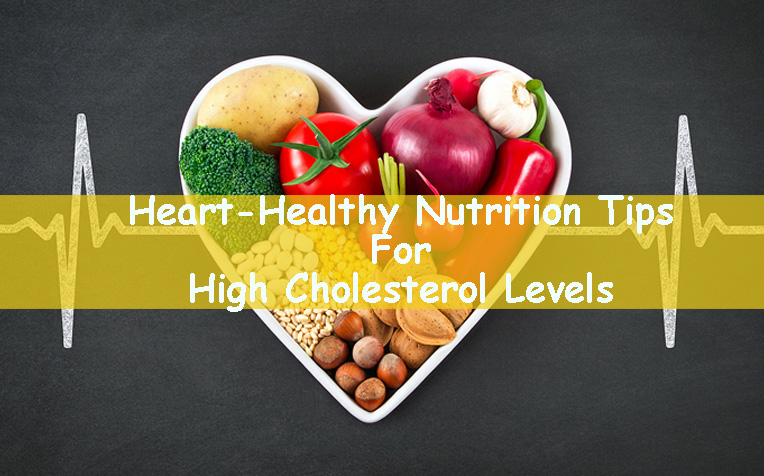Maintaining healthy cholesterol levels is essential for heart health. High cholesterol levels can increase the risk of heart disease and other cardiovascular problems. However, with the right dietary choices, you can effectively manage your cholesterol levels and promote a healthy heart. In this blog post, we will explore heart-healthy nutrition tips specifically designed to help individuals with high cholesterol. By incorporating these dietary recommendations into your lifestyle, you can take control of your cardiovascular health and reduce the risk of heart-related complications.
Understand Cholesterol and its Impact on Heart Health:
- Differentiate between LDL and HDL: Low-density lipoprotein (LDL) cholesterol is often referred to as “bad” cholesterol as it can build up in the arteries, leading to plaque formation. High-density lipoprotein (HDL) cholesterol, on the other hand, is known as “good” cholesterol as it helps remove LDL cholesterol from the bloodstream.
- Aim for Optimal Levels: Total cholesterol levels should be below 200 mg/dL, while LDL cholesterol levels should be below 100 mg/dL. Higher levels may require dietary modifications and medical interventions.
Focus on Heart-Healthy Fats:
- Reduce Saturated and Trans Fats: Limit or avoid foods high in saturated fats, such as fatty meats, full-fat dairy products, butter, and tropical oils. Avoid trans fats found in processed foods, fried foods, and baked goods, as they can raise LDL cholesterol levels.
- Choose Healthy Fats: Increase consumption of unsaturated fats found in avocados, nuts, seeds, olive oil, and fatty fish like salmon or mackerel. These fats have heart-protective effects and can help raise HDL cholesterol levels.
Increase Dietary Fiber:
- Choose Whole Grains: Opt for whole grain foods like oats, brown rice, quinoa, whole wheat bread, and whole grain pasta to increase fiber intake. These foods contain soluble fiber that helps lower LDL cholesterol levels.
- Embrace Fruits and Vegetables: Incorporate a variety of colorful fruits and vegetables into your meals. They are rich in soluble fiber, antioxidants, and phytochemicals that support heart health and lower cholesterol levels.
Include Heart-Healthy Proteins:
- Opt for Lean Protein Sources: Choose lean proteins such as skinless poultry, fish, eggs, legumes, and plant-based protein sources. These options are lower in saturated fat and can be beneficial for maintaining healthy cholesterol levels.
- Limit Red Meat Consumption: Reduce the intake of red meat and processed meats, as they can contain high levels of saturated fats. When consuming red meat, choose lean cuts and moderate portion sizes.
Be Mindful of Sodium and Added Sugars:
- Lower Sodium Intake: Avoid excessive salt intake, as it can increase blood pressure and promote water retention. Limit processed and packaged foods, and use herbs, spices, and other seasonings to enhance the flavor of your dishes.
- Limit Added Sugars: High intake of added sugars contributes to weight gain and increases the risk of heart disease. Minimize consumption of sugary beverages, processed snacks, and desserts.
Emphasize Heart-Healthy Habits:
- Maintain a Healthy Weight: Weight management plays a crucial role in heart health. Focus on consuming a balanced diet within your energy needs to achieve and maintain a healthy weight.
- Engage in Physical Activity: Regular exercise can help raise HDL cholesterol levels, lower LDL cholesterol, and improve overall cardiovascular health. Aim for at least 150 minutes of moderate-intensity aerobic exercise per week.
- Limit Alcohol Consumption: Moderate alcohol consumption may have some heart benefits. However, excessive alcohol intake can lead to various health problems. If you consume alcohol, limit yourself to moderate amounts.
Consult a Healthcare Professional:
- Personalized Advice: Consulting a healthcare professional or registered dietitian can provide personalized advice based on your specific cholesterol levels, health status, and dietary needs.
- Medication and Supplements: In some cases, medication or dietary supplements may be necessary to manage cholesterol levels effectively. Always consult a healthcare professional before starting any supplements or medications.
Conclusion:
Taking control of your cardiovascular health begins with making heart-healthy nutrition choices. By incorporating these tips into your diet, you can effectively manage your cholesterol levels and reduce the risk of heart-related complications. Focus on consuming heart-healthy fats, increasing dietary fiber, choosing lean proteins, being mindful of sodium and added sugars, and embracing heart-healthy habits.
Remember, these dietary changes should be part of a holistic approach to cardiovascular health that includes regular physical activity, weight management, and overall healthy lifestyle choices. By prioritizing your heart health through nutrition, you are taking an important step toward a healthier, happier life.

